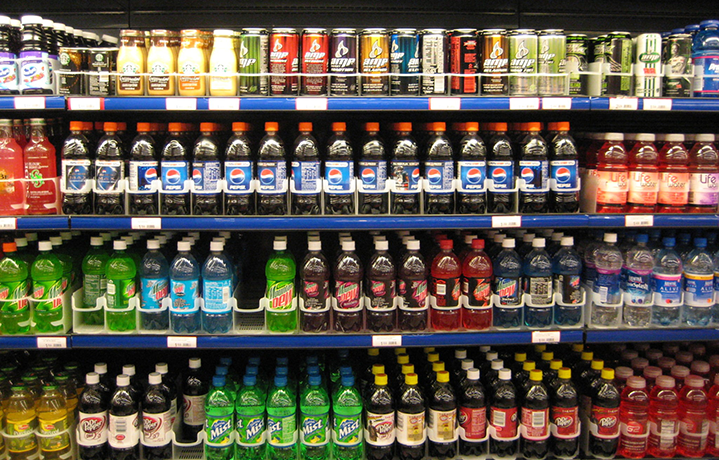Losing control over sugar
A common pollutant and sweetener mess with important hormones

Many sodas contain a sweetener called fructose. Scientists have shown how fructose can cause the body to produce excess amounts of insulin, a hormone used to control sugar in the blood.
Marlith/Wikimedia Commons
Inside your body, sugar goes hand-in-hand with a substance called insulin. A type of hormone, insulin regulates the activity of cells and tissues. It calls the shots after you devour that delicious donut, helping organs pluck a type of sugar called glucose from the bloodstream. When insulin is missing or doesn’t do its job, sugar accumulates in the blood instead of getting into and feeding cells. This throws the body’s balance out of whack, causing a disease called diabetes.
An organ called the pancreas, near the beginning of the large intestine, produces insulin. The more glucose that tickles the pancreas, the more insulin it produces to process the sugar. But new studies show that other things can also cause the pancreas to release insulin. In one study, a sugar called fructose boosted insulin levels; in another, a common pollutant called bisphenol A (BPA) caused the same reaction.
Fructose gives fruit, honey and high-fructose corn syrup their sweetness. Nutritionists — backed by scientific studies — say we eat too much high-fructose corn syrup, found in foods from soft drinks to salad dressing. Scientists working on one of the new studies used human cells, mouse cells and live mice to study what happens when fructose meets the pancreas.
The team found that cells in the pancreas can “taste” the fructose, in a process similar to how the tongue tastes sugar. The study, like many other recent discoveries, shows that taste buds can occur — and taste chemicals — far from the tongue. Fructose alone didn’t boost insulin levels. But in the study, when glucose and fructose appeared together, the pancreas produced more insulin than it did when it encountered glucose alone.
“The system seems to be elegantly made to keep a balance,” Björn Tyrberg told Science News. Tyrberg, who led the new work, studies the biology of cells at Sanford-Burnham Medical Research Institute in Orlando, Fla.
The body may have a hard time keeping that balance in the presence of BPA, too. This chemical, commonly found in plastics and cash register receipts, can imitate a hormone called estrogen. One of estrogen’s jobs is to keep track of insulin, telling the pancreas to produce more if it is needed.
In the second new study, scientists found that BPA, like estrogen, can trigger insulin production. But because BPA is a pollutant, it stimulates the pancreas to create insulin when it’s not needed. The researchers also demonstrated that it doesn’t take much BPA to get the pancreas to pump out extra insulin. BPA and fructose may be radically different compounds, but both can throw off the body’s balance in similar ways.
Angel Nadal of Miguel Hernández University in Elche, Spain, led the BPA study. He told Science News that extra insulin in the blood may cause other tissues to start ignoring this important hormone. Called “insulin resistance,” this condition can lead to the buildup of glucose in the blood indicative of type 2 diabetes. In experiments by Nadal and his colleagues, animals exposed to BPA ended up with insulin resistance more often than other animals did. Nadal thinks that BPA in the body may speed up the onset of type 2 diabetes in people with a family history of the disease.
Franck Mauvais-Jarvis of Northwestern University’s Feinberg School of Medicine in Chicago told Science News that he doesn’t think BPA alone can cause diabetes. Lots of different chemicals can throw off the body’s balance. He says, “I suspect it’s a cocktail of these nasties” that can make a person more likely to develop the disease.
POWER WORDS (adapted from the New Oxford American Dictionary)
pancreas A large gland located behind the stomach. It secretes digestive enzymes (proteins that stimulate or speed up chemical reactions) into the intestines. It also secretes the hormone insulin into the blood.
insulin A hormone produced in the pancreas. It regulates the amount of glucose in the blood. A lack of insulin or a loss in the body’s responsiveness to it can both cause diabetes.
fructose A simple sugar found in honey and fruit and the sugar that makes up half of each molecule of sucrose, or table sugar.
glucose A simple sugar that is an important energy source in living organisms and a component of many carbohydrates. It also makes up half of each molecule of sucrose, or table sugar.
hormone A regulatory substance produced in an organism and transported in tissue fluids such as blood to stimulate the activity of specific cells or tissues.







